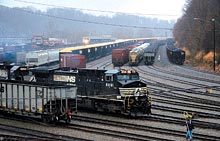Countless folk songs pay homage to the long, lonesome blow of a train whistle, a common note in any city with railroad crossings. But while a distant whistle may have the power to inspire traveling tunes, a train horn sounding right next to your home or workplace could make you wish you were traveling somewhere else.

According to RiverLink and its newly formed Railroad Quiet Zone Coalition, however, it’s distracting. The Asheville-based nonprofit hopes to muffle such sounds someday with a federally approved “railroad quiet zone.”
Executive Director Karen Cragnolin stresses that the coalition—made up of condominium developers, hoteliers, artists, retailers and others interested in the River District—has nothing against trains. “We love the trains,” she asserts. “We have never tired of waving hello to the conductor.” But the loud blasts sounding at least 12 times a day (and night) inhibit growth in the neighborhood, she maintains. “It goes through an area where we’re trying to attract some new infill development. It’s particularly worrisome for people who want to live here. At 3 a.m., they’ll blow you right out of bed.” The developers of the Lofts at Mica Village and The River condos, notes Cragnolin, are particularly concerned that the train’s warning blasts could drive away prospective buyers.
RiverLink and the new coalition are proposing a railroad quiet zone. Federal law requires trains on the Norfolk Southern line that runs through Asheville to sound their horns as they approach crossings. But with some infrastructure changes and the approval of the Federal Railroad Administration, it’s possible to establish an area where sounding the whistle is prohibited except in emergencies. The quiet zone, as they envision it, would extend from Glendale Bridge on the Swannanoa River to Pearson Bridge, just below the Richmond Hill Inn on the French Broad—a roughly five-mile stretch.
Norfolk Southern spokesperson Robin Chapman says the Federal Railroad Administration has approved quiet zones elsewhere. The main requirement is that new gates, or physical medians between lanes, be installed to ensure that cars can’t cross the tracks when a train is approaching. Norfolk Southern has had discussions with both the state Department of Transportation and the regional Metropolitan Planning Organization about the quiet zone, he notes, adding, “We would be happy to participate in any discussions” with the neighborhood coalition.
“Typically, the locality that wishes to establish a quiet zone would have to install those kinds of crossings at its own expense,” he cautions. “It’s not cheap to set these things up.”
Cragnolin, estimating the cost to be “$1 million-plus,” says RiverLink plans to approach the city for funding after seeking public input and hammering out a detailed proposal. “We think that with all the condos and mixed-use spaces that are planned, the return on investment would be quick,” she says.
On Thursday, Jan. 17, at 6 p.m., RiverLink will host an open informational meeting about the proposed railroad quiet zone in A-B Tech’s Simpson Auditorium. Visit www.ashevillequietzone.org to learn more.



Let me ge this straight… I see railroad tracks and hear trains. I buy the land. I build a condo while listening to the trains. But now it is the train’s fault that nobody wants to buy my condo’s for sale? is this correct. now the CITY with MY tax dollars is going to quiet things down so a private citizen will profit? Is this correct?
I say no to the seemingly deaf Developer.. Let the condo’s price drop to where someone who dosen’t mind the sounds of a train will buy one.
Ladies and Gentleman, I just helped save Asheville’s lower income housing problem.
Beautiful, Dale! You’re right! Build or buy next to a railroad, expect noise. End of argument.
“I hear the train a comin’, it’s rollin’ round the bend…” — J. Cash
Can’t all the retirees just turn their hearing aids down? That seems like the most cost effective solution.
I am all for the quiet zone, if it would be possible to increase the supply of buildable land without drastically compromising safety.
That’s right, Jim, the key IS safety. Train engineers are required to sound a warning when approaching rail crossings. This is a GOOD thing. I do not want to be placed in danger as a motorist because some fool from up North moved into an area close to the tracks when he or she should have known better. Safety is first and foremost. Northerners sleep is WAAAAAAAAY down that scale. ;-)
I have read that there is a correlation between cancer and high noise levels. Maybe we should be looking at safety from that angle?
Maybe we should also make a law that cars must blow their horn everytime they approach an intersection? If some people had their way, everyone who weighs more than 75 pounds would wear a siren around their neck in the name of ‘safety.’
This is not a new controversy. Here’s a story from 2004 in Boston:
http://www.thenoiseboard.com/index.php?showtopic=50408
To be blunt, Northerners tend to mess up their homes then move down here and attempt the same.
There are good and sufficient reasons for trains to sound their whistles and have been for well over 100 years. Some newcomer being irked does not come close to overriding tradition, necessity, and safety.
Blaming all your problems and dissatisfactions on newcomers and northerners does not come close to making a strong and convincing argument.
What, Jim? I don’t have any problems, it’s the idiots who get offended my train whistles that have the problems. It’s all the Northerns who move up here into the mountains and expect folk to act just like they do back home in New Jersey that have problems.
We mountaineers do not HAVE problems, we CREATE problems for flatlanders. We’ve been doing it for hundreds of years and are pretty dang good at it. ;-)